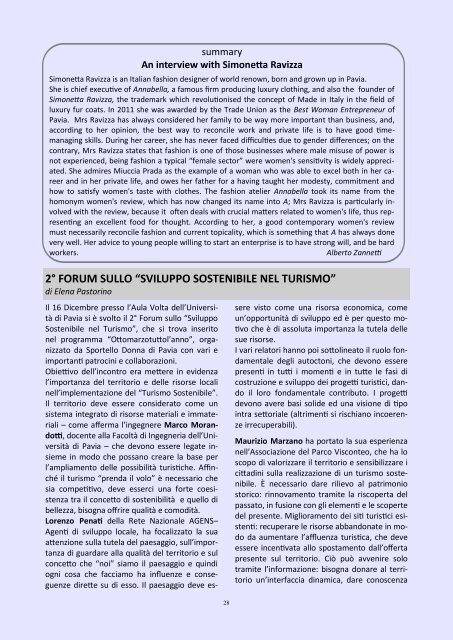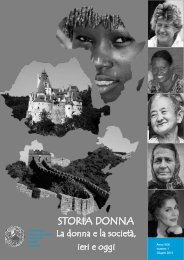n° 2 dicembre 2011 - Ifuw Italia – Fildis sez. di Pavia
n° 2 dicembre 2011 - Ifuw Italia – Fildis sez. di Pavia
n° 2 dicembre 2011 - Ifuw Italia – Fildis sez. di Pavia
You also want an ePaper? Increase the reach of your titles
YUMPU automatically turns print PDFs into web optimized ePapers that Google loves.
Il 16 Dicembre presso l’Aula Volta dell’Università<br />
<strong>di</strong> <strong>Pavia</strong> si è svolto il 2° Forum sullo “Sviluppo<br />
Sostenibile nel Turismo”, che si trova inserito<br />
nel programma “Ottomarzotuttol’anno”, organizzato<br />
da Sportello Donna <strong>di</strong> <strong>Pavia</strong> con vari e<br />
importanti patrocini e collaborazioni.<br />
Obiettivo dell’incontro era mettere in evidenza<br />
l’importanza del territorio e delle risorse locali<br />
nell’implementazione del “Turismo Sostenibile”.<br />
Il territorio deve essere considerato come un<br />
sistema integrato <strong>di</strong> risorse materiali e immateriali<br />
<strong>–</strong> come afferma l’ingegnere Marco Morandotti,<br />
docente alla Facoltà <strong>di</strong> Ingegneria dell’Università<br />
<strong>di</strong> <strong>Pavia</strong> <strong>–</strong> che devono essere legate insieme<br />
in modo che possano creare la base per<br />
l’ampliamento delle possibilità turistiche. Affinché<br />
il turismo “prenda il volo” è necessario che<br />
sia competitivo, deve esserci una forte coesistenza<br />
tra il concetto <strong>di</strong> sostenibilità e quello <strong>di</strong><br />
bellezza, bisogna offrire qualità e como<strong>di</strong>tà.<br />
Lorenzo Penati della Rete Nazionale AGENS<strong>–</strong><br />
Agenti <strong>di</strong> sviluppo locale, ha focalizzato la sua<br />
attenzione sulla tutela del paesaggio, sull’importanza<br />
<strong>di</strong> guardare alla qualità del territorio e sul<br />
concetto che “noi” siamo il paesaggio e quin<strong>di</strong><br />
ogni cosa che facciamo ha influenze e conseguenze<br />
<strong>di</strong>rette su <strong>di</strong> esso. Il paesaggio deve es-<br />
summary<br />
An interview with Simonetta Ravizza<br />
Simonetta Ravizza is an <strong>Italia</strong>n fashion designer of world renown, born and grown up in <strong>Pavia</strong>.<br />
She is chief executive of Annabella, a famous firm producing luxury clothing, and also the founder of<br />
Simonetta Ravizza, the trademark which revolutionised the concept of Made in Italy in the field of<br />
luxury fur coats. In <strong>2011</strong> she was awarded by the Trade Union as the Best Woman Entrepreneur of<br />
<strong>Pavia</strong>. Mrs Ravizza has always considered her family to be way more important than business, and,<br />
accor<strong>di</strong>ng to her opinion, the best way to reconcile work and private life is to have good timemanaging<br />
skills. During her career, she has never faced <strong>di</strong>fficulties due to gender <strong>di</strong>fferences; on the<br />
contrary, Mrs Ravizza states that fashion is one of those businesses where male misuse of power is<br />
not experienced, being fashion a typical “female sector” were women's sensitivity is widely appreciated.<br />
She admires Miuccia Prada as the example of a woman who was able to excel both in her career<br />
and in her private life, and owes her father for a having taught her modesty, commitment and<br />
how to satisfy women's taste with clothes. The fashion atelier Annabella took its name from the<br />
homonym women's review, which has now changed its name into A; Mrs Ravizza is particularly involved<br />
with the review, because it often deals with crucial matters related to women's life, thus representing<br />
an excellent food for thought. Accor<strong>di</strong>ng to her, a good contemporary women's review<br />
must necessarily reconcile fashion and current topicality, which is something that A has always done<br />
very well. Her advice to young people willing to start an enterprise is to have strong will, and be hard<br />
workers. Alberto Zannetti<br />
2° FORUM SULLO “SVILUPPO SOSTENIBILE NEL TURISMO”<br />
<strong>di</strong> Elena Pastorino<br />
28<br />
sere visto come una risorsa economica, come<br />
un’opportunità <strong>di</strong> sviluppo ed è per questo motivo<br />
che è <strong>di</strong> assoluta importanza la tutela delle<br />
sue risorse.<br />
I vari relatori hanno poi sottolineato il ruolo fondamentale<br />
degli autoctoni, che devono essere<br />
presenti in tutti i momenti e in tutte le fasi <strong>di</strong><br />
costruzione e sviluppo dei progetti turistici, dando<br />
il loro fondamentale contributo. I progetti<br />
devono avere basi solide ed una visione <strong>di</strong> tipo<br />
intra settoriale (altrimenti si rischiano incoerenze<br />
irrecuperabili).<br />
Maurizio Marzano ha portato la sua esperienza<br />
nell’Associazione del Parco Visconteo, che ha lo<br />
scopo <strong>di</strong> valorizzare il territorio e sensibilizzare i<br />
citta<strong>di</strong>ni sulla realizzazione <strong>di</strong> un turismo sostenibile.<br />
È necessario dare rilievo al patrimonio<br />
storico: rinnovamento tramite la riscoperta del<br />
passato, in fusione con gli elementi e le scoperte<br />
del presente. Miglioramento dei siti turistici esistenti:<br />
recuperare le risorse abbandonate in modo<br />
da aumentare l’affluenza turistica, che deve<br />
essere incentivata allo spostamento dall’offerta<br />
presente sul territorio. Ciò può avvenire solo<br />
tramite l’informazione: bisogna donare al territorio<br />
un’interfaccia <strong>di</strong>namica, dare conoscenza



